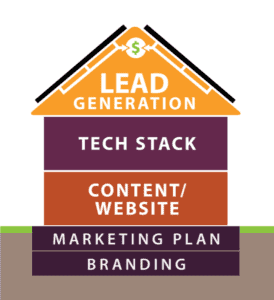At Clarity Quest, our clients range in size from small through enterprise-level health tech, biotech, and software companies. These companies often hire an agency to spearhead marketing campaigns or supplement internal resources.
I sat down with our two most recent hires, Lindsay Groth and Melanie Hilliard, who transitioned from in-house marketing to agency life to discuss what to look for when hiring an agency.
Question 1: What should a business look for when hiring an agency?
The agency needs to know how to speak the business’ language
Melanie Hilliard: An agency that really understands the niche area of the business is of high value. When I was in-house, I wanted to hire an agency that “could talk our talk.” My leadership required an agency with vertical sector expertise. Especially in more complex, niche businesses, having an agency that understands the ins and outs of what the business does on a daily basis and your target personas is so important.
A lot of businesses in these niche areas of the healthcare and health tech industries feel that no agency can truly understand what they do, so when an agency comes along who can “speak the language” that’s a huge differentiator.
Lindsay Groth: I agree, an agency that understands the language of what a company does is incredibly valuable and is a game-changer when it comes to making a decision. That was a main variable I looked for when I was in-house and would sacrifice other (need-to-haves) if I could find an agency that understood healthcare tech. Unfortunately, I never felt like I had found that true consultant who could help me speak the language. I always had to continually translate or help them understand the creative or messaging. I found Clarity Quest too late …
Do your research on the agency’s portfolio and references
MH: References and the list of clients the agency has worked with are the second most important elements when a company is choosing an agency. If one has to identify the top three agencies and pitch them to their leadership, references are critical to healthcare and IT professionals. Typically, they would not even consider an agency that did not have previous work experience with a healthcare or IT client.
Know the budget you have before calling agencies
LG: You don’t have to show your business’ budget card on the first call, but if they are a savvy agency this question is going to be a part of the first conversation. Whether there is $5,000 or $50,000 approved for agency engagement it is important to know so that you don’t waste everyone’s time. The agency should be able to share a ballpark once you have provided your business’ project objectives. I managed my budget so I knew what I had to spend and was fairly transparent – but even if you’re not the manager of it – it’s always important to know the range.
Before you even engage an agency, there has to be some internal consensus from the hiring group
MH: It’s vital that the hiring group knows their KPIs and messaging before looking for an agency. This may sound like a no brainer, but in fact, it can be a major setback if an agency starts to work with a business and it becomes apparent the business doesn’t know how to measure the success of what they engaged the agency to do or messaging statements aren’t even understood by internal employees of that business.
The brand needs to know how to talk about what they do. Plain and simple. If your business doesn’t have its high-level messaging down, then it’s not the right time to engage with an agency on lead generation campaigns. Hire them first for messaging and positioning work.
LG: My analogy to this is if you’re running the mile and you begin the race on lap 2 instead of at the start line. I can tell you from experience, bringing an agency at the beginning of the race versus the middle will yield a much better result and partnership. Having a true recognition of where your business is on their brand and marketing journey is so important, so make sure to have an honest conversation with stakeholders because this will make an agency engagement that much more beneficial and successful.
Agencies can only be as good as the data and information they are given. If an agency starts in the middle of the race without knowing, the engagement is not going to be as successful.
It’s a marathon, not a race
MH: Some CEOs and leadership teams have a perception that there’s a silver bullet campaign that will magically transform their business. Everyone wants a brilliant ad campaign “like Apple” without recognizing the talent and resources that went into building their brand. Great marketing takes hard work and time.
LG: In the same race analogy, maybe something has been missed that would have been caught had the initial agency engagement started at the beginning. Often, when an agency is scoped to start in the middle of the race, it’s discovered well into the project there are several unanswered questions requiring a deeper dive. Marketing is a marathon, not a race and if it’s being approached as a race, you’re probably not going to achieve your KPIs or accurately message your brand or have effective lead gen campaigns because the focus is on the wrong metric.



